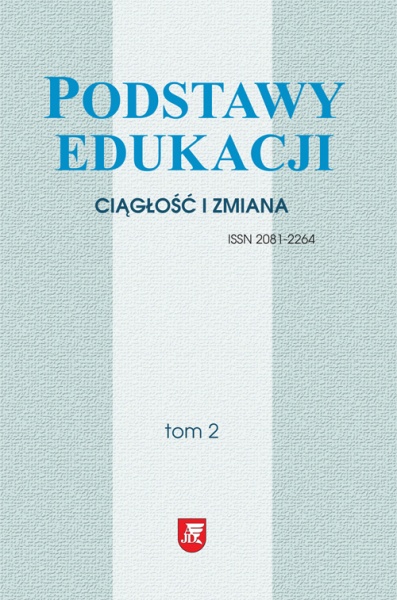Abstrakt
Nauka od zawsze jest poszukiwaniem prawdy. Karl Popper twierdzi, że Klasyczna idea nauki jako wiedzy prawdziwej, pewnej i dostatecznie uzasadnionej jest jeszcze żywa nawet do dzisiaj. […] Ale stała się przestarzała przed laty wraz z Einsteinowską rewolucją (K. Popper, 1997, s. 55). W nauce należy odrzucić dogmatyczne kryterium prawdy, gdyż tylko takie poszukiwania warte są najwyższej uwagi. Trzeba, jak mówił A. Einstein, znaleźć się na dobrej drodze (K. Popper, 1997, s. 58). Jaką obieram ścieżkę tej intelektualnej podróży? Jest to ścieżka pedagoga zainspirowanego fi zyką kwantową. Dlaczego? Otóż dlatego, że dostrzegam zaskakujące pokrewieństwo i wspólnotę myśli tych dziedzin. W edukacji, tak jak w fi zyce kwantowej, toczy się niezwykła, niewidzialna, bajeczna gra o nasze możliwości, potencjalności poznawania. Przestrzeń edukacyjna, tak jak fizyczna, nie jest tylko dana, ale ciągle (za)dana, nie tylko odkryta, ale ciągle odkrywana, jakby będąca w drodze! Jakie znaczenie z punktu widzenia edukacji ma metafora drogi? Jest w niej coś ważnego, coś nadzwyczajnego. Oznacza spotkanie na progu ja i drugiego, oznacza owo nieuchwytne i tajemnicze pomiędzy, którego „następstwem jednym z wielu jest/może być przemienianie możliwości człowieka w lepszy świat” (R. Łukaszewicz, 2005, s. 31), do tej pory niewidzialny. To, co niewidoczne, „ukryte bywa w szparach, szczelinach, pęknięciach prowadzących w głąb, pod powierzchnię, na drugą stronę rzeczywistości. Tej samej jednak” (J. Brach-Czaina,1992, s. 172). Dokąd zaprowadzi mnie ta ścieżka refleksyjnego namysłu? Jak sądzę, ku otwarciu, które wymaga zbudowania w nas przestrzeni wewnętrznej. Trzeba ją poszerzać, uchylać ku wyjściu na zewnątrz, poza siebie. Samo zaś otwarcie jest czystą potencjalnością. Jest przejawem zgody na różnorodność świata. Potrzebny jest jeszcze jakiś edukacyjny klucz! Być może, że Piąta siła „i” otworzy inne, potencjalne przestrzenie.
Bibliografia
Bancroft, A. (1991). Współcześni mistycy i mędrcy. M. Kuźniak (tłum.). Warszawa.
Bauman, Z. (2006). Płynna nowoczesność. T. Kunz (tłum.). Kraków.
Białkowski, G. (1982). Stare i nowe drogi fizyki. Fizyka XX wieku. Warszawa.
Bierdiajew, M. (2001). Sens twórczości. Próba usprawiedliwienia człowieka. H. Paprocki (tłum.). Kęty.
Boutaric, A. (1927). Życie atomów. S. Klemensiewiczowa (tłum.). Lwów.
Brach-Czaina, J. (1992). Szczeliny istnienia. Warszawa.
Bronowski, J. (1988). Potęga wyobraźni. Warszawa.
Chrostowski, J. (2008). Szybciej niż światło. Wiedza i Życie, 11.
Cooper, L. N. (1975). Istota i struktura fizyki. J. Kozubowski (tłum.). Warszawa.
Davis, P. (2008). Porządek wszechświata. Polityka (Niezbędnik Inteligenta), 16.
Grof, S. (1999). Poza mózg. I. Szewczyk (tłum.). Kraków.
Jung, C. G. (1976). Archetypy i symbole. J. Prokopiuk (tłum.). Warszawa.
Jacob, F. (1987). Gra możliwości. M. Kunicki-Goldfi nger (tłum.). Warszawa.
Jungk, R. (1967). Jaśniej niż tysiąc słońc. Losy badaczy atomu. H. Kahanowa (tłum.). Warszawa.
Kempny, M. (1996). Tradycja wobec zmiany: do czego tradycja kulturowa może służyć badaczom transformacji. W: M. Obuchowski (red.). Oblicza zmiany. Etnologia a współczesne transformacje społeczno-kulturowe. Międzychód.
Kolarzewski, J. (2005). Filozofowie i mistycy. Na drogach neoplatonizmu. Warszawa.
Łukaszewicz, R. M. (2002). Studia nad alternatywami w edukacji. Wrocław.
Łukaszewicz, R. M. (2005). Inne drogi edukacji. Wrocław.
Męczkowska, A. (2006). Podmiot i pedagogika. Od oświeceniowej utopii ku pokrytycznej dekonstrukcji. Wrocław.
Pluta, A. (2007). Mówiąc zmiana– myślimy tradycja. W: A. Pluta, E. Karpuszenko (red.). Między stałością a zmianą. Częstochowa.
Popper, K. (1992). Wiedza obiektywna. A. Chmielewski (tłum.). Warszawa.
Popper, K. (1996). Wszechświat otwarty. Argument na rzecz indeterminizmu. A. Chmielewski, (tłum.). Kraków.
Popper, K. (1997). W poszukiwaniu lepszego świata. A. Malinowski (tłum.). Warszawa.
Popper, K. (1998). Wiedza a zagadnienie ciała i umysłu. T. Baszniak (tłum.). Warszawa.
Prigogine, I., Stenger, I. (1990). Z chaosu ku porządkowi. Warszawa.
Prokopiuk, J. (1999). Labirynty herezji. Warszawa.
Sedlak, W. (1986). Na początku było jednak światło. Warszawa.
Tischner, J. (2002). Polski kształt dialogu. Kraków.
Wilber, K. (1996). Niepodzielone – wschodnie i zachodnie teorie rozwoju osobowości. T. Bieroń (tłum.). Poznań.
Wilber, K. (2000). Jeden smak. Przemyślenia nad integralną duchowością. H. Smagacz (tłum.). Warszawa.
Wilber, K. (2002). Psychologia integralna. H. Smagacz (tłum.). Warszawa.
Witkowski, L. (2003). Filozoficzność w kształceniu pedagogów jako otwieranie (się) na humanistykę. W: M. Dudzikowa (red.). Filozofia pedagogice. Pedagogika filozofii. Toruń.
What the bleep! Do we (k)now!? (2004). M. Vicente, B. Chasse, W. Arntz (reż.). USA LORD OF THE WIND FILMS, LLC [płyta DVD].
Yi-Fu Tuan (1987). Przestrzeń i miejsce. A. Morawińska (tłum.). Warszawa.
OŚWIADCZENIE AUTORA:
Mam świadomość, że czasopismo jest wydawane na licencji Creative Commons - Uznanie autorstwa (https://creativecommons.org/licenses/by/4.0/legalcode).
Przesyłając artykuł wyrażam zgodę na jego udostępnienie na tej licencji.
